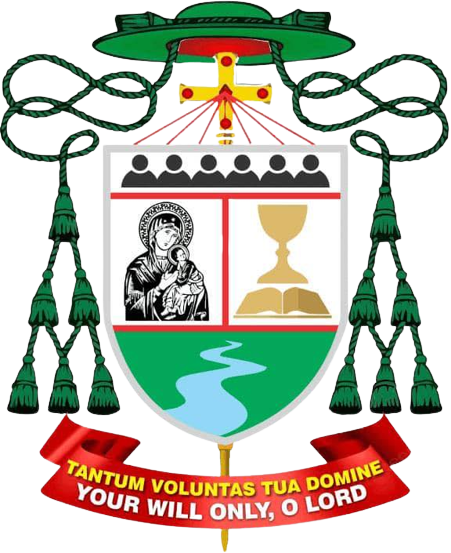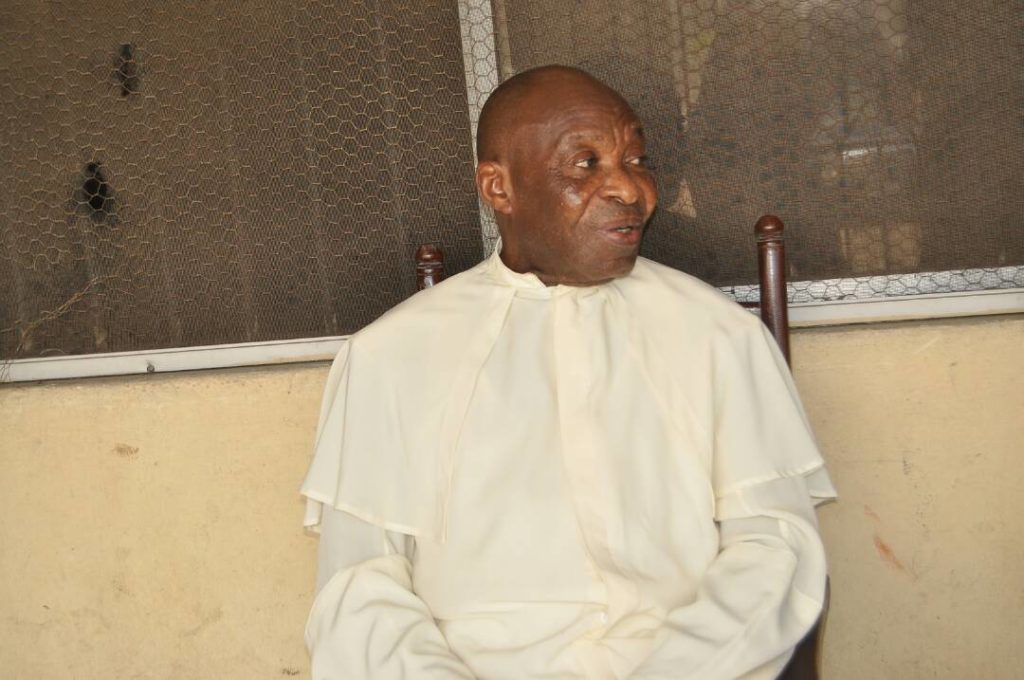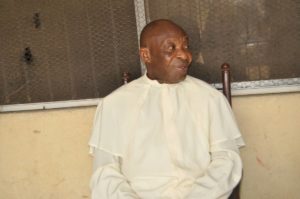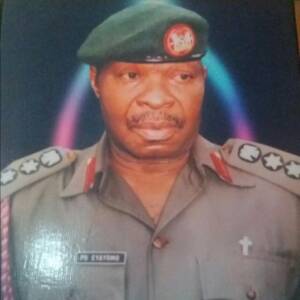Patrick Eyayamo is a war veteran of the Nigerian Army and also a Catholic Priest ordained for the Catholic Diocese of Warri in February 2, 1985. Briefly after his ordination, he was posted to the bishop court where he served for a period of two years, while serving there, he was assigned to the barracks as army chaplain in the present day Effurun barracks. It was while he was there, his physique, bravery and fitness attracted army officers in the barracks. He was seen as a beautiful, thorough material for the military, and so he was approached by some officers and encouraged to join the army. In 1987, Very Rev. Fr. Col. Eyayamo was commissioned into the Army Chaplaincy of the Nigerian Army after he undergoes all necessary training until his retirement in 2011. Born in October 1948, the soldier of Christ and of humanity will on October 10 clocked the ripe age of 70. Moved by his intimidating profile, Godwin Utuedoye of the Directorate of Social Communication Online Service Warri Diocese, Ufuoma Irene Iweh of the Messenger of Peace Magazine/Missionary Newspaper and Nyerhovwo Edoja of Veritas Communication cornered the erudite priest and veteran army for interview. Excerpts;
Very Rev. Fr. Col. Patrick Eyayomo
Good Morning Father. We are from the Directorate of Social Communications, Catholic Diocese of Warri, Publishers of Messenger of Peace Magazine/Missionary Newspaper and Veritas Studios/Online News reportage. We are here in view of your forth coming 70th birthday. It is a milestone achievement and our esteemed readers may like to meet you.
I am an Urhobo man by tribe, and was born in 1948. My father and my mother are from Urhobo, but my father mother is from Itsekiri. I was raised in Itsekiri and in Ghana. I was born 1948 and as a child, I attended primary school and later attend Holy Martyrs of Uganda Seminary Effurun. I proceed to the Major Seminary Bodija in Ibadan. When I finished my priestly formation, I was ordained priest and posted as a curate to the bishop court as a curate and at the same time assigned to the army barracks Warri as a chaplain for two years. During my apostolate at the barrack, officers in the barrack saw in me a material which they feel is good for the military, and so they worked on me and encouraged me, through them I enlisted in 1987.
(Cut in), Father I was going to ask you what really motivated you in joining the army, but you just answered that.
Father, as a priest and a soldier, how do you manage both as regard pastoral and military assignment?
Actually when I was joining the army, I didn’t know what it was, people were asking me then, how do you think you are going to cope as a priest and as a soldier. The moment you are commissioned as an officer, because the commission is meant for specialists/professionals such as Lawyers, Doctors, Journalists, Imams, Priests and so on. But once you are commission, irrespective of your profession, the military will give you their own military training as a soldier. It does not matter whether you are a priest (Reverend Father), doctor, or a lawyer. It is the rigorous and tedious training that is giving to everyone, once you are done or survived with that training, all those involved will be awarded equal ranks and from there, you can now go back to your field of . in the army, there are just three religion, namely; the Catholic Church, the Protestant Church and the Imam. As soon as you return back from training, your department; now in my case the Catholic Church, which is the Army Chaplaincy will again take on you. They will hand you the guide lines and the lay down of activities. Though there is no difference between the chaplaincy and the parish setting but the only difference is that as a parish priest in the civil parish is that the office of the parish priest is sited within the parish and everything about such priest is the priesthood. In terms of baptism, marriage and other sacrament is the same but you must do all these within the military composition. In the military, there is what is called regimental. It is not like in the parish setting were you can celebrate the Mass always, no. In the military, you are under a command and control. If your morning beat is twice a week, then your Mass will then be in the evening because as a soldier, you must attend and the people you want to celebrate the Mass with and are the people going for the exercise and you are one of them. Twice in the evenings is game, this time your masses will automatically changed to morning. When it is purely military exercise, you don’t put on priestly attires such as cassock but military combat on others, but when it come the church, there is no difference between the civil church and the military church. So as a priest and a soldier, you are managing two things together and you ate specially trained for these. Meanwhile in the military aspect, you work with them because it is a unit , and so if your unit is posted or relocated to Sokoto, Zamfara, Maiduguri and so forth, you must follow. If the soldiers are going for bush exercise for a month, you must follow including Sundays. If there is an exercise on Sundays, as a priest, you forget about Mass because all the people you will celebrate the with are there in the bush. In summary of it all, is when there is war, you must follow. For example I was in Sierra Leone, again in Liberia and in Liberia for the second time. (Silence here). Well I can say what I saw there. Heave a sigh, it was a tough one because you don’t remember whether or not you are a human as it was between life and death. Sometimes in three months, you don’t celebrate mass, and if you must celebrate mass maybe when the tension is down for a while, you just put your mass box on a stone, you don’t put on cassock because it will expose you to your enemies. So as a priest, there is no difference. You do whatever others are doing at the war front as you are with your rifle and other a munitions.
Very Rev. Fr. Colonel Patrick Eyayomo, Retired in Military Uniform
Interesting. But Father, a soldier once said; “I am paid, licensed and equipped to kill”. What is your reaction to this and as a soldier and a priest who have been to three different war, do you kill?
Sorry my dear. Let me tell you or answer that question this way. That soldier is wrong. When a soldier kills, he is not the one killing. It is an order of the federal government. A command is given and you must obey that command as a soldier. But any soldier who on his own or out of quarrelling with someone, he then killed that person such soldier must face the wrath of the military discipline. So I can tell you that such quotation is upside down and just a threat to civilians. More so, in war, bullet does not select who to kill. It does not select priest or lay man, as such you must carry your arms whether you like it or not. There is no difference. Even my catechists are all armed. For example, if we are advancing to a particular area to capture enemies, it can take three months you know. It is so because you don’t walk on the road but through the bush and every soldier will line up with their guns and go quietly. Moment they suspect anything, a command will be given to fire, and everyone including the priest fires sporadically and in some cases, bomber jets will be firing . Then in this case, how can you know if you have killed somebody or not? But at the end, some of your men will be injured, and in that case, you can’t say I am a priest I cannot follow. Staying behind in the barracks is useless because there will be no one to minister to as a priest. The truth is that at the moment of firing shots, you as a priest must be part of it. Again, war is different from what you watch in your films. In war you don’t even see your enemies that you will fired at, it is most likely not possible. If you are living my parish here in Otovwodo to a place like Ekuigbo, and you are shelling, troops must be on ground and it is the ground troop that I belong then. It will be a sporadic firing to scare your enemies away and to as well protect you. That is what it entails, and the priest who is also a soldier must be involved and be part of it. An important aspect of it all is your casualty. Like you have the engineers, the doctors, (medicals) have theirs, so too the priest does. The priest attend to the injured too and the sick. You must hear their confessions, and also anoint them. When the troop assume a shield during moving from one place to the other, they will take a brief rest. Every soldier will dig a trench and be there alone with your gun, but sometimes two to one trench. At this time, when the place is calm, the priest soldier will go round each soldier gently to attend to those who need his priestly attendance.
How has the Catholic Priesthood contributed to the growth of the Nigeria Armed Forces?
I will say the Catholic priesthood has contributed a great lot because the human being is made up of body and soul. You cannot separate them from each other. The idea of military chaplain started long ago in Britain by the Queens order. They accorded a very high regard to take care of the welfare of souls in the military. It is so managed that it involves every religion. Just as civilians needs the pastoral care of a priest, the same way the soldier cannot do without it. For instance, the presence of the soldier priest will be needed during independence day to pray. Army remembrance day, the chaplain must be there to pray. The military will always begin with prayers and end with prayers. I will testify also, that religion is best and better practiced in the military, when it come to prayer like that, they won’t say this is Iman, a Catholic or that. The most senior officer in rank leads the prayer for all christians. In the same vein, if anything happened to either a christian or a Muslim, everyone must be there.
Tell us of your most cherished or bitter experience as a priest serving in the army
One thing I know and will tell you is that any priest who is not humble by nature, cannot make it in the military. It is true because, no one cares about who you are, be you a Doctor, a Lawyer a Priest or Engineer, they don’t care. But they respected your calling. But no matter your calling, once you are ask to do something, you must obey. It is unlike the civil church. In the military you have your boundary. Even in church on Sunday, when you preach the homily, you always have at the back of your mind that your seniors are in church, but it does not deter you from seating the truth. But yo must be balanced and bring in your maturity into it. The priest have no option once a command is given. These I can say were really challenging because it unlike the parish setting were the priest is the superior and no one speaks or command him around the parish. In the military, you must keep the rules and laws. Within the military as a priest, they have their own headquarters which is the chaplaincy, the Superior there; though he is not a bishop, but when he post you or gives a command, you dare not disobey. If he says go to Sambista forest or Zamfara, you don’t talk but move. Unlike in the diocesan setting were you see some of us proving stubborn or disobeyi g the bishop. You are controlled and you don’t even think of disobedience. These were really bitter experiences but the good thing is that the military has really make me strong and fearless.
Until you were enlisted into the military, how was your priesthood life like?
Well, I only spent two years in the diocese after ordination and like I told you, I was a curate, but as a very young priest, I was so free, and had no one challenging my movement. To be sincere with you, I so much enjoy the priesthood of that time tan the priesthood of today because then I never thought of having a house, a car or other material things. So it was a very sweet thing then.
What do you think is the cause of the changes in present day priesthood?
Hmmmm! First I will say the economy and second is education and civilization. All these has affected the priesthood seriously.
Why we thank God for your life as you are about joining the league of the 70’s, and as it is you are among the few priests who have attained this age. Recalling your successes and coming back to the diocese, what can you say of the faithful in Warri Diocese and the Diocese in general?
Yes, I can say that by the time I left for the army, the diocese in terms of development, religious and administratively, was about 50%,but now I think I can score or rate it at 75% if I want to be sincere in terms of development, expansion and growth .
In your days we can say the priesthood was a calling, but our present day, many are of the opinion it is no longer a calling but a venture for money making especially as the economy bits hard on everyone, no job, no money etc. How do you react to this?M
y reaction to that is that it is partially true which can be expected. Many go into the priesthood without knowing what it is. The motive may not be for money, but just don’t know what it is. And you find out that such priests do not do well at all. It is either they fall away or there must be one problem and other. And some of such priests live on their own because it seems they were forced into it and truly, this is not a true calling. But in most cases, when you are not truly called, you may not make it; but if you are called; no matter the hurdles, you will make it. The important thing the priesthood, is not being ordained, as for me I see that the day you are ordained, you better carry your cross because it is tougher by the day.
Do you still encourage young priests to joining the armyI have been singing it because I have never regretted joining the army. The army makes me a man. Though everybody is a man but the military makes me more real. For instance, I encouraged Rev. Fr. Charles Ikoti and after he was commissioned and officer, I sent a congratulatory message to him in our priests group chat were I said; “You are now a real man”. Many of the priests were not happy with me but I know ehatvi meant. The kind of shock I can withstand and take as a soldier, not every civilian can take or withstand. It is not everywhere I can go as a trained soldier that most of us can go. As it is, I cannot fear you because you are carrying a rifle. I have been trained for that and I can stand anywhere in the world to talk without fear. This is what I mean when I say ‘real man’. But many misconstrued me. As a soldier, I am trained to be realistic with everything and in everything without fear or favour. I have to be blunt and honest to myself. The thing I know I cannot do, I don’t accept it. The military tells you to be a balanced man, though it is not as if the priestly training does not provide for that but you gain this way and this way.



